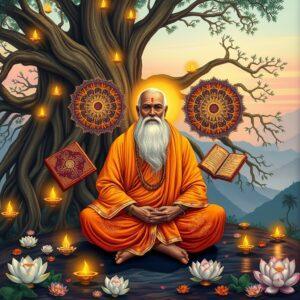Delving into the Anguttara Nikaya: A Comprehensive Guide

The Anguttara Nikaya, a cornerstone of Theravada Buddhist scripture, offers a structured and insightful path towards spiritual understanding. This collection, part of the Sutta Pitaka within the Pali Canon, presents the Buddha’s teachings in a unique numerical format, organizing discourses (suttas) based on the number of items discussed. This systematic approach, reflected in the name “Anguttara” meaning “incremental” or “gradual,” allows for progressive learning and a deeper grasp of Buddhist principles.
Understanding the Structure and Content
The Anguttara Nikaya’s organization is central to its accessibility. Divided into eleven books, or nipatas, each focuses on a specific numerical category. For instance, the Book of Ones addresses single concepts, the Book of Twos explores pairs of ideas, and so on. This structure, with its 9,557 suttas, aids memorization and facilitates a systematic study of the Buddha’s teachings. These suttas range from concise sayings to extensive dialogues, covering a wide spectrum of topics including ethical conduct (sila), mental discipline (samadhi), and wisdom (pañña).
Within the Anguttara Nikaya, several suttas stand out for their profound insights. The Kalama Sutta, for example, encourages critical thinking and independent investigation, while the Mangala Sutta outlines the 38 blessings for a well-lived life. These teachings, rooted in the socio-cultural context of ancient India, continue to offer timeless wisdom and practical guidance for contemporary Buddhist practice.
Authorship and Historical Context
While the teachings within the Anguttara Nikaya are attributed to the Buddha, the compilation itself is a testament to the dedication of his disciples. Following the Buddha’s parinirvana (passing), his followers, notably Ananda known for his exceptional memory, meticulously preserved the teachings through oral transmission. Later, during the First Buddhist Council, these oral traditions were formalized and organized, forming the foundation of the Pali Canon.
King Ashoka, a pivotal figure in Buddhist history, played a crucial role in promoting the preservation and dissemination of these texts. The Theravada tradition, with its emphasis on maintaining the integrity of the Pali Canon, has ensured the Anguttara Nikaya’s survival through centuries. Today, thanks to the efforts of modern scholars, translations of the Anguttara Nikaya are widely available, making these profound teachings accessible to a global audience.
Significance and Relevance
The Anguttara Nikaya holds immense significance for both monastic communities and lay practitioners. Its structured approach offers a gradual path to spiritual development, emphasizing incremental learning and consistent practice. The teachings within the Anguttara Nikaya provide practical advice for navigating daily life, cultivating ethical conduct, and developing mental clarity through meditation.
Beyond its practical applications, the Anguttara Nikaya offers profound philosophical insights into the nature of existence, suffering, and the path to liberation. Its influence extends to other Buddhist traditions and texts, solidifying its place as a foundational text within the broader Buddhist landscape. By exploring the Anguttara Nikaya, individuals can gain a deeper understanding of the Buddha’s teachings and embark on a transformative journey of self-discovery and spiritual growth.
Enhance Your Buddhist Study with Sacred Items from Poojn.in
Deepen your understanding and practice of the Anguttara Nikaya with authentic items from Poojn.in, India’s leading provider of sacred goods and services. We offer a wide selection of products to support your Buddhist journey:
- Ashoka Tree Products: Discover authentic Ashoka tree products, including prayer beads and bark, revered for their connection to enlightenment. These products symbolize the strength and resilience of the Buddhist path.
- Meditation Supplies: Create a serene meditation space with our high-quality meditation cushions, incense, and statues. Enhance your focus and mindfulness with these supportive tools.
- Sacred Texts and Literature: Explore a wide range of Buddhist texts and commentaries to deepen your knowledge and understanding of the Anguttara Nikaya and other essential scriptures.
Visit Poojn.in today to explore our comprehensive collection and enhance your Buddhist practice.
Rudraksha and Tulsi: Sacred Hindu Symbols Explained
Meditation and Mantras: Your Path to Inner Peace


